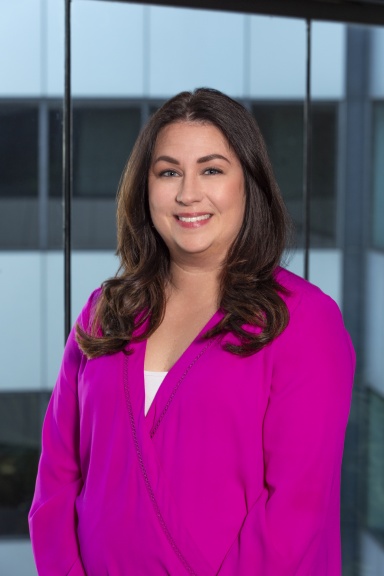This summer Vanderbilt Health Employer Solutions began a pilot to provide nurse navigation services for Metro Nashville Public Schools (MNPS). The service offers a faster, more convenient way for employees to get care when and where they need it throughout the Vanderbilt Health System.
Tyler Banks, LCSW, helps MNPS patients find effective solutions to life’s challenges. A licensed clinical social worker, she can provide short-term counseling or connect patient to longer-term behavioral health care, share community resources to help patients and their families meet basic needs, and support patient with education on topics such as work/life balance, parenting, and coping with anxiety and depression.
A North Carolina native, Banks earned a bachelor’s degree in social work from Western Kentucky University and a master’s in social work from University of Tennessee at Knoxville. She initially came to Nashville in 2008 to work as an intensive, in-home family therapist. She worked with Youth Villages, a nonprofit which provides behavioral health and supportive care to young people in foster care, in-home and residential treatment, and adoption services. In 2014, Banks started with the Vanderbilt Health System as a child/adolescent social worker and then became a manager at the Vanderbilt Psychiatric Hospital. She moved to the Nurse Navigation team in March 2023.
Banks answered a few questions for Employer Insights:
Why is mental health sometimes a neglected part of whole-person care?
That’s a complicated answer. Everyone’s experience is different. Some people have never had any experience with the mental health care system or grew up in families where mental health wasn’t discussed at all. Others may know someone who lived with a mental health diagnosis, but their families were secretive or avoided talking about it.
Historically there has been a lot of stigma around mental health. Because symptoms of depression, for example, aren’t visible, people are sometimes dismissed when they talk about feeling sad and hopeless—or told to “Just get over it,” or “Pull yourself together.” But I'm excited that this attitude seems to be shifting, especially since the pandemic, and pursuing mental health care is being normalized and even encouraged. We are seeing a lot more attention being paid to mental health and employers like MNPS recognizing how important it is.
Why is it vital to put more emphasis on mental health?
With my experience in the inpatient psychiatric setting, I gained perspective on what happens when you don't pay attention to the indicators that you aren’t doing well, or that your loved ones aren’t doing well. We know that the more you ignore a problem, the more prominent of an issue it becomes. It’s going to demand attention at some point.
You emphasize how the body, mind and spirit are very much connected. How do you help patients understand the importance of caring for their whole person?
We use the analogy all the time that, like on an airplane, you must put on your own oxygen mask first. You must care for yourself to be able to care for others. It's very important in any caring profession, like teaching. We see that a lot in health care, too. When folks aren't taking care of themselves, it makes it very difficult for them to do their jobs, manage stress and attain a better work/life balance. It results in poor productivity, illness and burnout.
I talk in some of my educational presentations about the importance of both passive and active self-care. Passive self-care involves those temporary, short-term things we can do to fill our cup to restore our energy and promote our well-being. Active self-care is more intentional, with deep and ongoing work to strengthen the mind and body connection, maybe by changing patterns that aren’t working for you. It’s important to prioritize both types of self-care.
Teachers and other MNPS employees are so busy, and it can be exhausting to figure out how and where to get help. How will Vanderbilt Health Nurse Navigation provide this support?
We realize it can be hard to find what you need in an enormous system like Vanderbilt. That’s why this team makes it easier for MNPS employees to take care of themselves, no matter their needs.
We know that MNPS employees could use support to connect to services in the MNPS clinics and access health care outside of school hours, so we’re going to help with that. We know that these teachers live all over the city, and even the state, so we’re going to help them access telehealth services. We know that they need resources for behavioral health needs, so we’re going to connect them to behavioral health nurse practitioners in the MNPS clinics as well as resources outside of the system as well.
Ultimately, we want to help MNPS keep its teachers healthy and happy, which then impacts our community because our kids are learning from these great teachers. It feels really good to be part of that.
What do you like to do in your free time and help yourself stay centered?
My husband is a Nashville native, and we have two young daughters, and a dog and a cat. We like to be outside, and we like to hike and garden. I love to cook. Though I am a “true extrovert at heart” and enjoy teamwork and interaction with patients in my work, I also really value alone time and try to make that happen, too—sometimes by bingeing a favorite TV show!
